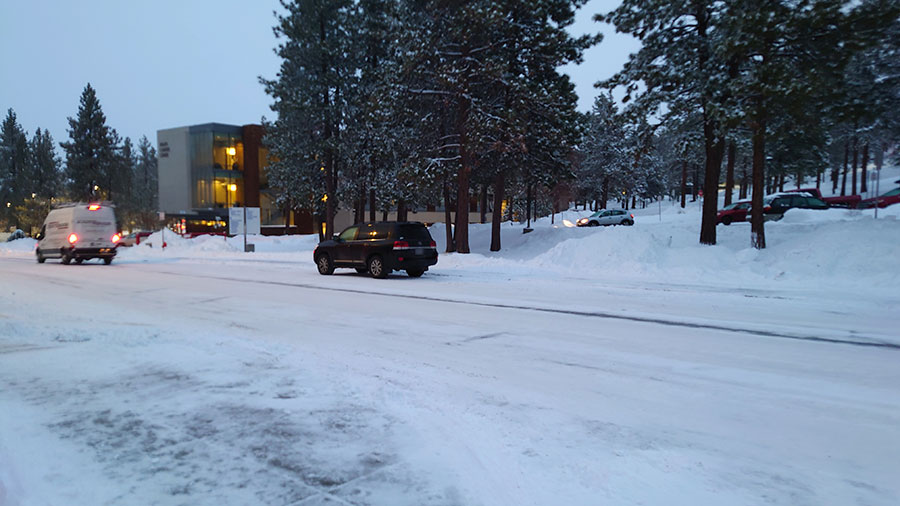Central Oregon Community College got off to a slippery start in 2024, when snow and ice storms led to five full days and two half-days of closures in the first two weeks of winter term. Students and staff scrambled to make up for lost time in the 10-week quarter, and college administrators are reexamining the policies that led to the closures.
The quarter started on Jan. 8 and snow blew in the following day, leading to an early closure of all four campuses on Jan. 9. Online courses were also canceled. Freezing rain followed, and frigid temperatures led to thick, lasting ice.
The final decision to close fell to Michael LaLonde, COCC’s vice president of finance and operations. He gathers reports from campus ground crews and also considers closure decisions by surrounding school districts. The ice was so bad that he had to put chains on his car after he drove to campus during the storm to assess the roads, he said.
“What I have to really worry about is the safety of people on campus. We had some people slip and fall and, you know, that’s some workers’ comp claims,” LaLonde said.
Joshua Clawson, director of campus services, said when stormy weather is forecast, the grounds crew reports to work at 4 a.m. to begin clearing snow from common thoroughfares and evacuation routes. Clawson meets with the crew at 5 a.m. to get a report.
When campuses were closed, all classes were canceled. LaLonde said this is because it’s too confusing for faculty and students to keep track of which courses are canceled and which ones are still happening online. There is also an equity issue, he said, because not every student has access to high speed internet without COCC’s computer labs.
Yasuko Jackson, eLearning instructional coordinator for COCC, said a different decision would mean that students in an asynchronous class have an advantage over students taking in-person classes.
Jahnik Williams, a second year student studying business at COCC, said he wishes online classes had not been canceled.
“I think online classes would have been great, just to be able to stay up to date with school and not have it affect the schedule,” he said.
One of the Wednesday cancellations was first announced as a late opening, with campuses scheduled to open at 10 a.m. But at about 9:20 a.m., the college sent out a mobile alert that campuses were closed for the entire day. Some students and staff were already on their way to campus.
Not all classes were disrupted equally. Courses that met Mondays and Wednesdays, for example, met only once during the first two weeks, due to the weather closures and the Martin Luther King, Jr. holiday.
Andria Woodell, chair of the psychology department, said that in one of her classes, social psychology, half of her students didn’t return after the first two weeks. They were still enrolled but hadn’t attended in-person classes. She said the closures reset students’ expectations and they figured they wouldn’t have to show up in-person.
Woodell has taught at COCC for 20 years and has never had this happen before. She said she and other faculty are stressed about making sure their students learn what they’re supposed to learn. She’s worried students will not be able to pass the course without attending lectures.
The work compounds, she said. The course content on week three depends on knowledge gained in weeks one and two. Woodell said a student who is new to college wouldn’t necessarily know the amount of work they’re missing and how detrimental it is.
Logan Aisling, a chemistry instructor who hadn’t taught during winter before, said, “That’s a definite loss to the winter quarter. They’re going to, I think over time, have less labs than in fall, summer or spring quarter because of snow days.” He said none of his labs coincided with the snow days, which is lucky because they took place just once a week.
“You simply can’t make up labs in chemistry,” Aisling said. “We just don’t have the resources for that. We’d put too much of a demand on our lab techs if we were to do makeups.”
Jackson, from eLearning, said some instructors reached out to her department and asked if they could record lectures and post them online for students to access in Canvas. COCC has no official guidelines about this, Jackson said. Instead, faculty made their own decisions about how to get students caught up.
LaLonde said the college’s senior leadership team, made up of COCC’s president and vice presidents, met on Feb. 12 to reassess COCC’s weather closure policies.
Not much was changed in terms of logistics and closures, nor policy for missed class time. “Faculty have the option to update [Canvas], so that there is other things students can do if we do close,” LaLonde said.
“We did change the emergency message that went out to include that other information about ‘go to campus to see if there’s anything else you can do’,” he said.








